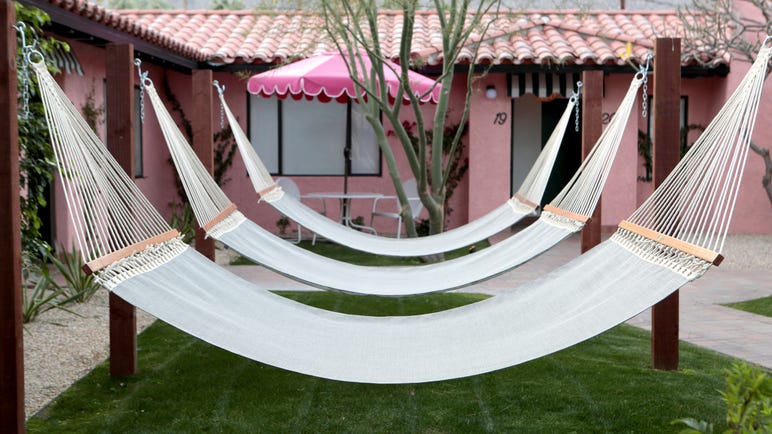By Melissa Daniels | USA Today
Travelers have been heading to small, quirky hotels in Palm Springs for the better part of a century, and this year, a batch of new properties is putting a fresh spin on desert hospitality.
So far, this season has seen the opening of Tuscany Manor, a 24-room clothing-optional property in the Little Tuscany neighborhood; Les Cactus, an affordable 27-room design-oriented stay in Warm Sands; and Dive Palm Springs, a supremely private, 11-room French-inspired getaway.
While Palm Springs’ hospitality business was built on the boutique hotels that catered to visiting Los Angeles residents as far back as the late 1920s, the Palm Springs Bureau of Tourism says that today, boutiques are in the minority: About 38% of the city’s 140-some hotels have 50 rooms or fewer.
On deck to open later this month is The Cole Hotel on North Palm Canyon Drive. The 30-unit hotel was built in the late 1950s and most recently operated as the Bahama Hotel apartments, which the city declared a nuisance before the site changed hands in 2018. The new hotel will lean heavily on midcentury modern furniture and decor. View|66 PhotosPhotos: Palm Springs’ new hotels: Tuscany Manor, Dive Palm Springs, Les Cactus
Up for a different experience?: Palm Springs has a new clothing-optional hotel: Take a look inside Tuscany Manor
Bonjour, travelers: New boutique hotels in Palm Springs: Dive brings a luxurious French twist to desert
If you’re looking for a deal: New Palm Springs hotels: At about $200 a night, Les Cactus is an affordable, stylish add
The openings don’t signal a huge jump in the number of hotel beds in Palm Springs, as several are renovations of existing hotels. And while it sounds like increased competition could spell trouble for existing properties, the director of the Palm Springs Bureau of Tourism, Mary Jo Ginther, said that first-time Palm Springs tourists may stay at a familiar brand like a Hyatt or Hilton, then discover small, independently owned properties once they’re here and come back for another visit.
“These smaller, unique experiences actually create a reason for visitors to return, in much the same way that an attraction would in another city,” she said. “They discover a favorite small hotel and plan a return trip specifically around the availability of that property.”
Occupancy taxes fill city coffers
Overnight guests remain the biggest single moneymaker for Palm Springs. Transient occupancy taxes (TOT), charged at 13.5% for group meeting hotels and 11.5% for all others, are projected to hit $35 million in the 2019-2020 fiscal year, representing about 30% of the city’s total revenue.
In the 2018-2019 budget year, Palm Springs received $33 million in TOT revenue, more than double what it brought in eight years earlier. Taxes are collected from traditional hotels and vacation rentals (which contribute an increasingly larger share of the taxes).
Around that same time, Palm Springs launched an incentive program that allowed the city to share transient occupancy tax proceeds with developers, as is done in other desert cities.
Since February 2019, that program has relaunched with a focus on spurring development at smaller properties. The city has lowered the minimum amount a developer must invest to qualify for a rebate. Under the new rules, those who are renovating and putting in the equivalent of at least $5,000 per room can apply.
The rebate is a 50-50 split that goes on for 10 years or until the developer recoups their investment, whichever happens first.
Mayor Geoff Kors calls this program a “win-win,” saying the city will receive TOT revenues and see job creation.
“If they’re investing through an incentive program, they have to pay prevailing wage, which means we’re going to have better jobs for people here who are working to build those hotels,” he said.
Meeting demand for unique experience
Marina Rossi has operated a boutique hotel in the Historic Tennis Club for about about 15 years. The Rossi, which she runs with her daughter Avalon, has received accolades from hospitality publications for offering a luxurious, private experience — in 2018, Conde Nast’s Traveler Hot List called the property “best combination of hotel amenities and Airbnb privacy.”
Rossi said much of her business comes from word of mouth. They don’t advertise or participate in booking sites like Expedia. Now, their 11 rooms book months in advance.
Rossi said providing a unique experience comes down to details and services that can’t be found elsewhere. “Avalon and I are on a constant search, ‘How do we make it unique? How do we differentiate our product? What can we do here? What can we do there?'” Rossi said.
Guests at The Rossi, for example, get room service provided by local restaurants. The bath and body products are made in Joshua Tree. Avalon curates the poolside playlists. This year, they’re offering crepe breakfasts.
“Not only does the physicality of the building need to be unique, and the physical amenities of the property, but also the added amenities like the private chef that comes to your room,” Rossi said.
Bruce Abney, who sits on the board of the California Association of Boutique and Breakfast Inns and runs the El Morocco Inn and Spa Resort in Desert Hot Springs, said some travelers like to “collect” hotels — they want to find an interesting place to tell their friends about and stay somewhere different every time.
Small properties also popular among leisure travelers who are looking for a relaxing and private stay, Abney said. That includes celebrities, who are less likely to be approached by strangers in a small place.
“They’re smaller, and they’re more accessible, and they’re not as intimidating,” he said. “You don’t have to be dressed up, you can just go in and see the little inns.”
All the hoteliers interviewed for this story said they want their guests to feel like they’re at home or at a friend’s house during their stay.
“There’s so much passion in the innkeepers who have purchased these things that they want to make sure you have a good time,” Abney said. “They’re not detached from the property the way big properties can be.”
Future of the scene
The popularity of independently owned hotels and tailored experiences — such as properties designed around food, fitness, or wellness — is prompting global hotel companies to launch niche brands, said Daniel Loera, the president and CEO of RevPAR Lobby Services Inc., a hotel management and consulting firm.
Among the boutique-like offerings from big brands was the January rollout of Tempo by Hilton, which appears targeted toward younger customers who are interested in wellness and sustainability.
In the face of increased competition, Loera said small hotels are smart to continue to offer a personalized experience on top of essential basics like a good bed and Wi-Fi.
Read more >> http://ow.ly/sqBA50ygDC9








